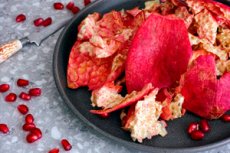New publications
Pomegranate peel extract restores skin balance and fights infections
Last reviewed: 02.07.2025

All iLive content is medically reviewed or fact checked to ensure as much factual accuracy as possible.
We have strict sourcing guidelines and only link to reputable media sites, academic research institutions and, whenever possible, medically peer reviewed studies. Note that the numbers in parentheses ([1], [2], etc.) are clickable links to these studies.
If you feel that any of our content is inaccurate, out-of-date, or otherwise questionable, please select it and press Ctrl + Enter.

A study published in the journal PLOS ONE describes the effectiveness of pomegranate peel extract in restoring skin microbiota homeostasis through its antimicrobial activity against Staphylococcus aureus.
The skin microbiota is a multitude of microorganisms that live in equilibrium and form an interspecies balance of the microbial community. The composition of the skin microbiota depends on the area of the body, age, gender, and pH level of the skin.
The predominant microbial species of the skin microbiota belong to the genera Staphylococcus, Corynebacterium, Streptococcus, and Propionibacterium. Staphylococcus epidermidis (S. epidermidis) is the most common member of the genus Staphylococcus and plays an important role in maintaining the microbial balance on the skin.
In healthy skin microbiota, S. hominis, S. lugdunensis, and S. epidermidis exert antimicrobial activity against Gram-positive bacteria such as S. aureus. Any disruption of skin microbial homeostasis can lead to dysbiosis, which is characterized by a decrease in beneficial microbes such as S. epidermidis and an increase in pathogenic microbes such as S. aureus.
Dysbiosis of the skin microbiota is associated with various skin diseases, including acne, atopic dermatitis, folliculitis, and psoriasis. Patients with atopic dermatitis are particularly likely to have increased numbers of S. aureus.
In this study, the researchers examined the antimicrobial and anti-adhesive effects of pomegranate peel extract against skin microbiota strains. They also assessed the species-specific activity of the extract.
Previous studies have shown the antibacterial effects of pomegranate peel extract against various bacterial strains, including S. aureus, Escherichia coli, and Pseudomonas aeruginosa. Several phenolic compounds found in pomegranate are responsible for its antimicrobial properties.
The scientists collected samples of skin microbiota from six healthy volunteers and three volunteers with atopic dermatitis. Among the isolated bacterial colonies, they selected S. epidermidis and S. aureus for further experiments.
They prepared pomegranate peel extract using n-butane and dimethyl ether solvents and analyzed its antimicrobial and anti-adhesive (influence on biofilm formation) activity against selected bacterial strains. They used Galleria mellonella larvae to test the toxicity of the extract.
A total of 67 microorganisms were identified from the skin of healthy volunteers, with the most common being S. epidermidis, Micrococcus luteus, Cutibacterium acnes and S. hominis. The main bacterial genus was Staphylococcus.
Variation in the composition of the skin microbiota was observed among volunteers depending on their geographical origin and skin condition. The only strain isolated from volunteers with atopic dermatitis was S. aureus.
Phytochemical analysis of pomegranate peel extract revealed catechin, quercetin, vanillic acid and gallic acid as the main bioactive compounds.
Antimicrobial activity
A comparison between the two extraction solvents showed that dimethyl ether-based extraction had the highest antimicrobial activity against bacteria, with minimum inhibitory concentrations (MICs) ranging from 1 to 128 milligrams per milliliter.
Anti-adhesive activity
The anti-adhesive activity of dimethyl ether-based pomegranate peel extract was determined against mono- and double biofilms of S. epidermidis and S. aureus.
The results showed that the extract significantly increased the biofilm formation ability of S. epidermidis and significantly decreased the biofilm formation ability of S. aureus. Biofilm formation is a complex process in which microorganisms adopt multicellular behavior that facilitates and prolongs their survival in various ecological niches.
Further analysis of the anti-adhesive effect on S. aureus after 24 hours showed that the extract was able to reduce bacterial biomass by 16% without affecting the growth rate of S. epidermidis.
Toxicity test
A toxicity test of dimethyl ether-based pomegranate peel extract using Galleria mellonella larvae showed 90% and 80% larval survival at the highest concentration of the extract after one and seven days, respectively.
The predicted survival rates were similar to those of buffer-treated larvae (control), indicating the non-toxic effect of the dimethyl ether-based pomegranate peel extract.
The study showed that pomegranate peel extract is a practical and non-toxic agent for restoring the homeostasis of skin microbiota in a species-specific manner. The dimethyl ether-based pomegranate peel extract prepared in the study effectively restored beneficial bacterial species (S. epidermidis) and eliminated pathogenic bacterial species (S. aureus).
Increased numbers of S. aureus are known to be associated with the formation of skin lesions that are difficult to treat due to the bacteria's ability to form biofilms and become drug resistant.
One useful method to restore skin microbiota homeostasis is to stimulate the growth of beneficial bacteria such as S. epidermidis, which can effectively inhibit S. aureus virulence gene expression, quorum sensing, and ultimately biofilm formation.
The powerful antioxidant, anti-inflammatory, and antimicrobial properties of the phenolic compounds found in pomegranate peel, including catechin, quercetin, vanillic acid, and gallic acid, may be responsible for the observed skin benefits. Previous studies have shown that catechins exert antimicrobial effects on S. aureus and E. coli by damaging cell membranes.
Overall, the study suggests that pomegranate peel extract could be considered as part of local formulas using recycled waste and green extraction methods in line with the One Health approach.
